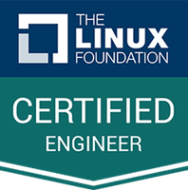Linux Foundation Certified Engineer (LFCE)

La Certificación Linux System Engineer o Linux Foundation Certified Engineer (para ser preciso) es ideal para ingenieros linux con al menos tres a cinco años de experiencia en este campo. Está diseñado para el profesional que busca demostrar un nivel más avanzado de habilidades y tiene el objetivo de ayudarlo a calificar para una promoción en el trabajo, o bien, para conseguir nuevos desafíos laborales. El examen se basa en el manejo depurado de la línea de comandos e incluye elementos que simulan escenarios en el trabajo.
Datos Importantes
Tanto el curso como el examen se hallan solamente en inglés.
La certificación como Linux System Engineer de la Linux Foundation se halla en la modalidad "A tu propio ritmo" (eliges tus horarios y días de estudio).
Tienes hasta un año para hacer el curso de la Linux Foundation y para rendir la prueba..
El costo del CURSO + el VOUCHER para el examen de certificación tiene un precio de 575 dólares.
Para nuestros alumnos, tenemos cupones de descuento que les permiten adquirir el CURSO + el VOUCHER a precios preferenciales.
Además, nosotros apoyamos de forma decidida el proceso de certificación de nuestros alumnos, ofreciendoles, de forma paralela, material educativo que apoye el buen rendimiento de su examen.
Método de pago: Tarjeta de crédito. En cualquiera de los caso, el pago se hace directamente a la Linux Foundation (en su página web).
Este es el detalle del programa de estudios del curso de la Linux Foundation para certificar como Linux System Engineer
Linux Networking and Administration (LFS211)
Chapter 1. Course Introduction
Chapter 2. Linux Networking (Concepts and Review)
Chapter 3. Network Configuration
Chapter 4. Network Troubleshooting and Monitoring
Chapter 5. Remote Access
Chapter 6. Domain Name Service
Chapter 7. HTTP Servers
Chapter 8. Advanced HTTP Servers
Chapter 9. Email Servers
Chapter 10. File Sharing
Chapter 11. Advanced Networking
Chapter 12. HTTP Caching
Chapter 13. Network File Systems
Chapter 14. Introduction to Network Security
Chapter 15. Firewalls
Chapter 16. High Availability
Chapter 17. Databases
Chapter 18. System Log
Chapter 19. Package Management
Este es el detalle de los temarios que abarcará el examen de Certificación de la Linux Foundation para optar a la Certificación Linux System Engineer .
Essential Commands – 5%
Use version control tools
Manipulate file content programmatically
Run commands on many systems simultaneously
Install Linux Distribution
Operation of Running Systems – 18%
Monitor, tune and troubleshoot system performance
Update operating systems to provide required functionality and security
Update the kernel and ensure the system is bootable
Script automation tools to make work faster and more accurate
Train team members on new technology or changes to existing systems
Maintain systems via configuration management tools
Maintain the integrity and availability of hardware
Develop and test disaster recovery plans
Support incident management for outages/trouble
Produce and deliver reports on system use (processor, memory, disk, and network), outages, and user requests
Monitor security and conduct audits
Manipulate Linux system during the recovery process
Use udev for device detection and management
Configure and modify SELinux/AppArmor policies
User and Group Management – 10%
Connect to an external authentication source
Configure advanced PAM
Networking – 15%
Monitor, tune and troubleshoot network performance
Configure network traffic tunneling
Configure a system to perform Network Address Translation
Dynamically route IP traffic
Implement advanced packet filtering
Service Configuration – 17%
Implement and configure an HTTP server
Implement and configure time synchronization server
Implement and configure network logging server
Configure a DHCP server
Implement and configure an SMTP service
Implement and configure the HTTP proxy server
Configure host-based and user-based security for a service
Implement and configure a centralized authentication server
Implement and configure a PXE Boot server
Implement and configure an authoritative DNS server
Storage Management – 10%
Manage advanced LVM configuration
Identify storage devices using block device attributes
Manage Linux file system features and flags
Implement and configure remote block storage devices
Implement and configure network shares
System Design and Deployment – 25%
Define a capacity planning strategy
Conduct post deployment verifications
Create and maintain software packages
Create, configure and maintain containers
Deploy, configure, and maintain high availability/clustering/replication
Postula Aquí
Envíanos este formulario y formaliza tu postulación
